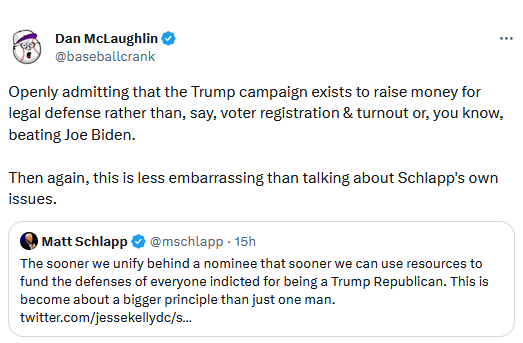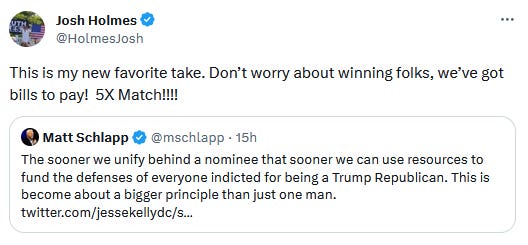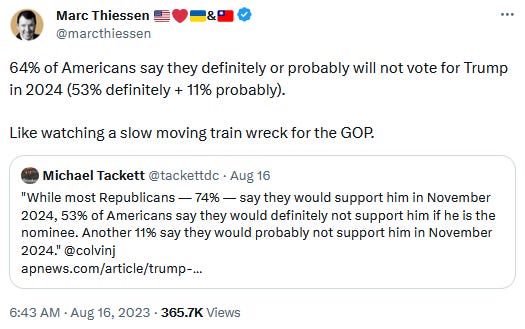I’ve seen a number of political commentators over the past few days arguing that this week’s GOP primary debate will change the calculus of the race. I have my doubts, but I sure hope they’re right, because the volume of stupidity in this contest thus far has been tough to watch.
It’s not just that a twice-impeached, criminally indicted former president — who spent his final weeks in office trying to overturn U.S. democracy and denying our country of it’s peaceful transfer of power — remains the dominant front-runner. It’s also how unserious and ill-equipped several of his primary opponents have demonstrated themselves to be in their supposed efforts to defeat him.
As I’ve written many times, I understand that this is no easy task. I get that Republican candidates feel that in order to succeed Trump, they have to make inroads with a seemingly impenetrable personality-cult that regards Trump more highly than the baby Jesus. But what a number of challengers are still struggling with, as we head into September, is the reality that in order to succeed Trump, they must defeat him.
Sure, that was never the goal for some of these people. It’s been pretty clear from early on that at least a few of them entered the race — with Trump’s blessing — to advance their public profile. In some cases, it’s been to build a professional side-brand off of MAGA fandom. It’s pretty telling, after all, when Roger Stone — a Trump-pardoned loyal ally to the former president — praises you for your service to the Trump campaign.
In other cases, the end-game is a potential high-level position in a second Trump administration. Either way, the unspoken understanding is that any portion of the pie those candidates manage to carve out for themselves will eventually end up, in one way or another, on Trump’s plate.
What’s perhaps even more discouraging is that the campaign strategy of the candidate best positioned to defeat Trump appears reliant on outside forces (whether they be legal challenges, a health episode, or something else) eliminating Trump from contention. I’m talking about Ron DeSantis, whose frequent aim seems to be to pick up the pieces of an eventually self-imploded Trump candidacy, and carry them across the finish line.
There’s been plenty of evidence of this, but perhaps the strongest thus far has come from a leaked pre-debate memo from an organization associated with DeSantis’s Never Back Down PAC. The firm, presumably having studied research data on the Republican base, recommended four “basic must-dos” for DeSantis on the debate stage:
Attack Joe Biden and the media 3-5 times.
State [DeSantis’s] positive vision 2-3 times.
Hammer Vivek Ramaswamy in a response.
Defend Donald Trump in absentia in response to a Chris Christie attack.
The first two are no-brainers. A Republican candidate can’t go wrong attacking a Democratic president or the media. And laying out a positive vision will never hurt a political campaign. Three and four, however, are pretty darned telling: “defend” Donald Trump (the runaway front-runner), and “hammer” Vivek Ramaswamy (who’s currently a distant third).
Who came up with this strategy, the folks behind Ted Cruz’s 2016 campaign? Or maybe Jeb Bush’s?
This isn’t a plan for winning a primary. It’s a plan for finishing a weak second… unless, again, you’re expecting Trump to derail on his own… as lots of his rivals were in 2016. That, of course, never happened.
When you see stuff like this, as well as the polls showing that no other Trump challenger is even registering in double-digits, it’s easy to conclude that this primary is already over. That’s certainly what Trump is banking on. He’s already calling for his Republican competitors to drop out of the race and “unify” behind him… a full five months before the first voting begins. I mean, what better way to raise much needed funds to cover Trump’s growing legal expenses?
Prominent Trump surrogates including Kari Lake and Matt Schlapp are making the same call, with Schlapp actually admitting that the move is about paying for lawyers, not political campaigning.
“The sooner we unify behind a nominee that sooner we can use resources to fund the defenses of everyone indicted for being a Trump Republican,” wrote the head of CPAC.
The strategy triggered some pretty good responses:
Holmes was being sarcastic when he wrote “Don’t worry about winning,” but his remark begs a serious question: Do Republicans voters even care about winning next year’s general election?
There’s some strong polling evidence, explored by people like National Review’s Noah Rothman, that indeed suggests that a significant portion of the Republican base would rather lose (again) with Trump, than defeat Joe Biden with a different Republican. They even seem to find virtue in that position.
Hopefully that virtue will help ease their later pain if numbers like this hold true:
For those of us actually interested in not only defeating Joe Biden, but replacing him with someone who’s at least minimally fit to serve in elected-office, changing the calculus of the GOP primary would be a great thing. With any luck the debates will help deliver that change.
Trump has already announced that he won’t be participating in the first one, choosing instead to schedule an apparent pro-Trump infomercial with former Fox News personality, Tucker Carlson. Carlson, who was fired from the network following an almost $800 million defamation lawsuit settlement over the airing of false 2020-election claims, may hate Trump passionately in real life, but in front of the cameras, he can always be relied on to greet the former president with a warm-water sponge bath.
As cowardly as the decision was for a non-incumbent, declining the debate stage was probably a smart political move. Trump’s never been a good debater, and because he’s so far ahead in the polls, he can likely afford to take a pass on at least this first one without losing much momentum. Participating would have, for the first time, put him on equal footing with his competitors. There, he’d have had to field another round of tough questioning from Bret Baier, and face some stiff haymakers from Chris Christie. Trump decided that the safe play was to hide rather than fight.
In Trump’s absence, the goal of his opponents should be to perform so well, and hit him so hard, that the former president decides he needs to show up at the other debates. In a twist of irony, the leaking of Team-DeSantis’s debate recommendations might actually assist with that effort. To possibly compensate for the embarrassment of the memo, the Florida governor seems to be sharpening his critiques of both Trump and MAGA orthodoxy.
“Ultimately, a movement can’t be about the personality of one individual,” DeSantis said in an interview released last Friday. “The movement has got to be about what are you trying to achieve on behalf of the American people, and that’s got to be based in principle. Because if you’re not rooted in principle, if all we are is listless vessels that’re just supposed to follow, you know, whatever happens to come down the pike on Truth Social every morning, that’s not going to be a durable movement.”
Well said. Let’s hear that type of talk in the debates.









Very well put John. an excellent summation!
With Trump not showing up, there's a good chance none of Trump's disciples will bother watching the debate. Frankly, other than some political news junkies, it's hard to imagine many, if any, other folks will be tuning in. Unless someone gets off a one-liner that makes the rounds the next day, the debate will be forgotten by next week, unfortunately.